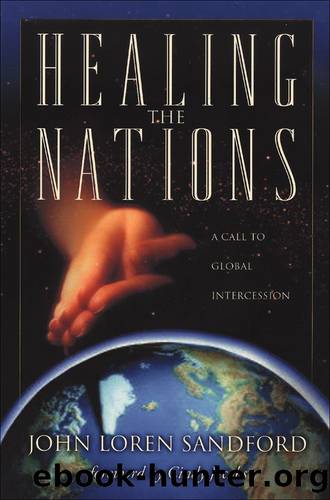Healing the Nations by John Loren Sandford

Author:John Loren Sandford
Language: eng
Format: epub
ISBN: 9781441215246
Publisher: Baker Publishing Group
They are fathers (or mothers) of religious movements or of ethnic or political nations.
They are people through whom God blesses others.
They are people God can trust to teach othersâtheir own children and their spiritual sons and daughters.
They can be trusted to walk in the ways of righteousness and justice.
Where else in Scripture do we see human participation in heavenly councils?
Jeremiah spoke forcefully about councils of God that should have been attended by men.
âWho has stood in the council of the LORD, that he should see and hear His word? Who has given heed to His word and listened? . . . If they had stood in My council, then they would have announced My words to My people, and would have turned them back from their evil way and from the evil of their deeds.â
Jeremiah 23:18, 22
Jeremiah was not speaking merely of listening to God. Had that been the case, he would have said simply, âWho has heard God clearly?â In other verses in this chapter, Jeremiah scolded the prophets for hearing lying words and seeing lying visions. Here he referred specifically to standing in the council of Godâand showing forth the power of that council to turn mankind from evil.
On the Mount of Transfiguration our Lord Jesus Christ held a council with Moses and Elijahâcertainly two who met the qualifications of Genesis 18. Together they spoke about Jesusâ âdeparture which He was about to accomplish at Jerusalemâ (Luke 9:31).
One might ask, since Jesusâ death was foretold from the beginning of time, why a council was necessary. The problem was to get to the cross. Jesus could and should have been stoned to deathâthe prescribed penalty for blasphemy, which the religious elite thought He had committed. I believe Jesus was strategizing with Moses and Elijah how to so infuriate the priesthood and disillusion the masses that simple death would not be enough. Jesus had to make them want desperately to crucify Him, both for the vengeance of it and because, being hanged on a tree, He would lose all favor in the peopleâs sight and become accursed, â[redeeming us] from the curse of the Lawâ (Galatians 3:13).
Although many events are predestinedâfor example, God âchose us in Him before the foundation of the world . . . [and] predestined us to adoption as sonsâ (Ephesians 1:4â5)âthere are always decisions to be made in the process of history. Nothing in Godâs Kingdom is fatalistic or deterministic. If God knows the end of all things, He also knows how to manage the process that results in whatever was predicted, all the while respecting our free will. Councils are part of His process and providence.
In seeking to corroborate his own ministry to the Corinthians, Paul described a vision widely considered to be his own, but from which he did not feel permitted to share what he had heard:
I know a man in Christ who fourteen years agoâwhether in the body I do not know, or out of the body I do not know, God knowsâsuch a man was caught up to the third heaven.
Download
This site does not store any files on its server. We only index and link to content provided by other sites. Please contact the content providers to delete copyright contents if any and email us, we'll remove relevant links or contents immediately.
The 5 Love Languages: The Secret to Love That Lasts by Gary Chapman(9758)
The Space Between by Michelle L. Teichman(6911)
Assassin’s Fate by Robin Hobb(6184)
Wiseguy by Nicholas Pileggi(5743)
Everything Happens for a Reason by Kate Bowler(4722)
Gerald's Game by Stephen King(4623)
Pillow Thoughts by Courtney Peppernell(4261)
A Simplified Life by Emily Ley(4143)
The Power of Positive Thinking by Norman Vincent Peale(4045)
Harry Potter and the Prisoner of Azkaban (Book 3) by J. K. Rowling(3337)
Resisting Happiness by Matthew Kelly(3331)
Girl, Wash Your Face by Rachel Hollis(3270)
Being Aware of Being Aware by Rupert Spira(3262)
The Code Book by Simon Singh(3160)
The Secret Power of Speaking God's Word by Joyce Meyer(3138)
More Language of Letting Go: 366 New Daily Meditations by Melody Beattie(3014)
Real Sex by Lauren F. Winner(3000)
Name Book, The: Over 10,000 Names--Their Meanings, Origins, and Spiritual Significance by Astoria Dorothy(2962)
The Holy Spirit by Billy Graham(2931)
